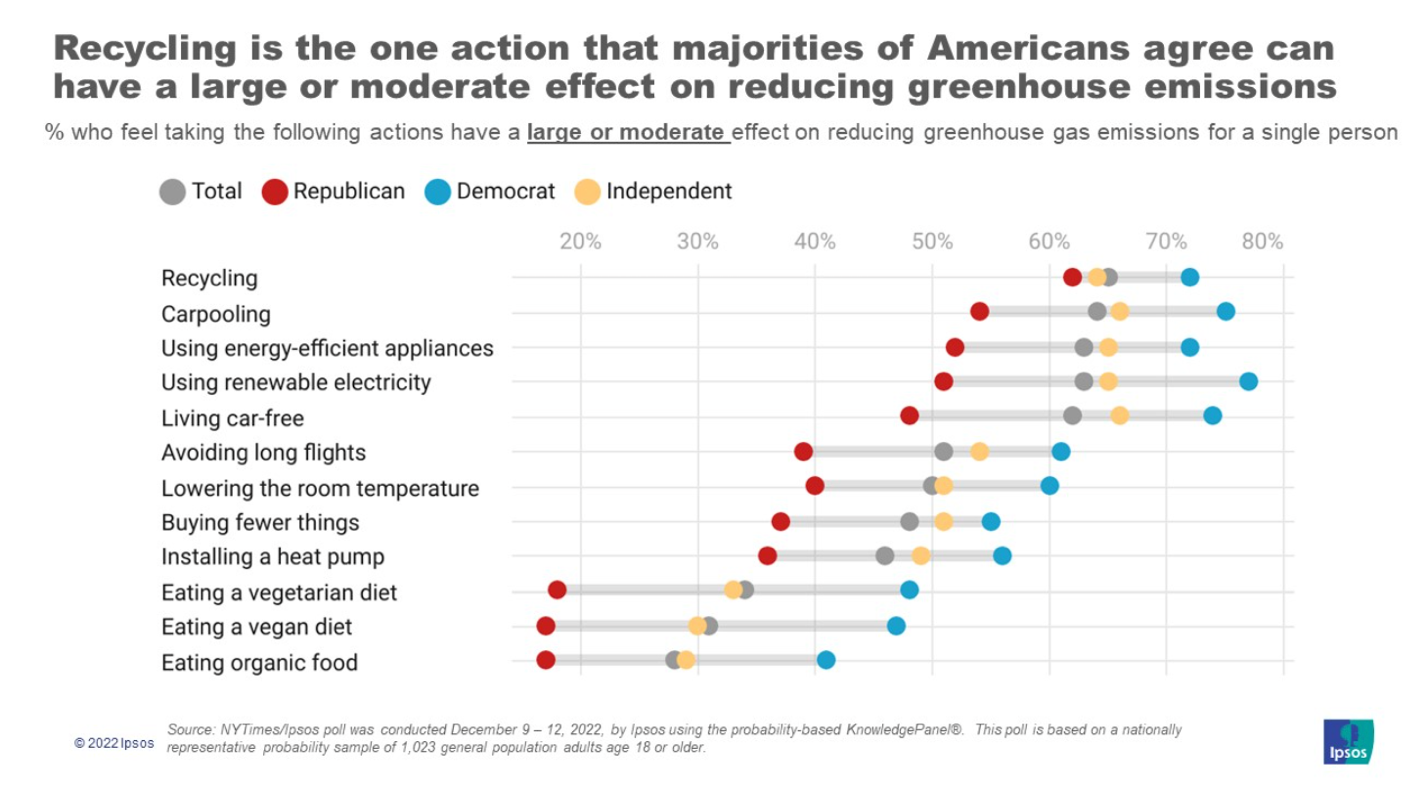I find the last week of the year is a great time to both pause and reflect, and at the same time look ahead for ways to improve in the new year. Today, as I gathered the trash and recycling that has quickly accumulated from the holidays and moved the bins down to the curb, I realized we really don’t know as much as we collectively should about how our families’ efforts at recycling ties into the much larger picture of reducing our impact on the environment. I recently found a NYTimes/Ipsos poll conducted the beginning of this month by Ipsos, using a nationally representative probability sample group of 1,023 adults ages 18 or older. A link to the summary of the NYT/Ipsos findings is here.

If you want to test your own knowledge on this front, you can take the NYTimes/Ipsos interactive quiz here.
If you take a quick look online, you see that lists of ways to reduce your personal greenhouse gas emissions are popular, and recommendations range from using energy-saving light bulbs to not having children. The number of options is overwhelming, but there’s another problem — people adopt habits that may seem significant, but in reality, actually have a very small chance of limiting climate change.
Majorities of Americans think recycling, using energy efficient appliances, and carpooling have a large or moderate effect on personally reducing greenhouse gas emissions, despite research showing that these don’t make as much of a difference. We’re split on the impact of avoiding long flights, lowering the room temperature, buying fewer things, and installing a heat pump. I hadn’t even thought about the fact that eating vegetarian, vegan, or organic food might have an impact on our personal emissions and I know I’m not alone on that front. There are a lot of studies out there, and a lot of passionate people on the side of vegetarianism saving the planet. But according to a study by Swedish vegetarians of the environmental impact on going entirely vegetarian for the rest of your life shows you’ll reduce your emissions by a whopping 2%.
We tend to mix up the primary benefit of recycling, less pollution and waste, with the potential to meaningfully address a very different problem: climate change. Researchers of climate change have observed this in the past, finding that Americans tend to mix up environmental problems like pollution, the hole in the ozone layer, and the greenhouse effect. The Wiley Risk Analysis dives into this, as well.
We’ve talked here before about the need to truly overhaul the system we use for recycling, but as individuals our personal options are limited. The problem has been further fueled by misinformation from the fossil fuel industry spending millions of dollars on ads imploring people to recycle, despite the fact that a large majority of plastic products can’t be reused and end up in landfills. California has recognized this and taken an aggressive tact. The attorney general announced an investigation earlier this year into the fossil fuel and petrochemical industries’ “aggressive campaign” to promote recycling and “deceive the public.” Basically, the large ad spend was intended to repeat misinformation enough times until it became the truth.
So, where do we go from here? It’s hard to know exactly what your own carbon footprint looks like but focusing on the things that researchers have documented as doing the most good is a great place to start. Knowledge is the best tool to fight purposeful efforts of misinformation. Google research has even found that people can be “vaccinated” against these kind of campaigns — that teaching people how to spot misinformation made them more skeptical of it.
While businesses and governments have the real leverage when it comes to effecting climate change, we can still hold their collective feet to the fire to make them accountable for their actions. Beyond that, we can switch our thinking to those activities that we know make the most difference, like switching to clean energy, choosing to travel by air less, and even perhaps adding more plant-based foods to our diet. I try and remind myself on the regular that we’ve got just one planet and taking care of the Earth is a job that requires all of us to understand the dangers of emissions and actions we can take to help. Together, we can effect change.
Jeff Jacobs has been an expert in building brands and brand stewardship for 40 years, working in commercial television, Hollywood film and home video, publishing, and promotional brand merchandise. He’s a staunch advocate of consumer product safety and has a deep passion and belief regarding the issues surrounding compliance and corporate social responsibility. He retired as executive director of Quality Certification Alliance, the only non-profit dedicated to helping suppliers provide safe and compliant promotional products. Before that, he was director of brand merchandise for Michelin. Connect with Jeff on Twitter, LinkedIn, Instagram, or read his latest musings on food, travel and social media on his personal blog jeffreypjacobs.com. Email jacobs.jeffreyp@gmail.com.